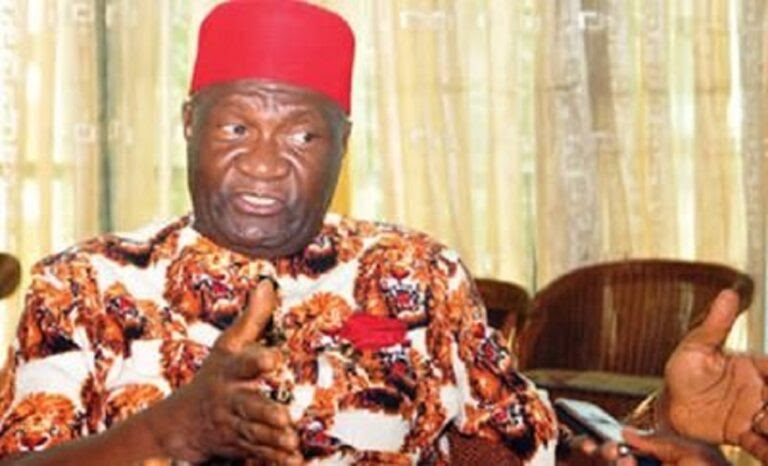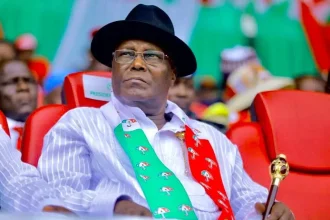Former Information Minister and ex-Ohanaeze Ndigbo leader, Chief John Nnia Nwodo, warned that without restructuring to give federating units control over natural resources, while keeping federal oversight through royalties or taxes, Nigeria risks a regional boycott by the 2027 election.
He also raised alarm over the future of Nigeria, cautioning that the nation may disintegrate before the 2027 general elections unless decisive steps are taken to overhaul its political structure.
Nwodo delivered this warning on Wednesday in Abuja during a keynote lecture titled “How Did We Get Here?” at the launch of two books authored by veteran journalist Ike Abonyi.
The event, held at the Shehu Musa Yar’Adua Centre, drew a crowd of prominent political figures, including Labour Party’s 2023 presidential candidate and former Anambra State Governor, Peter Obi; PDP stalwart Alhaji Mohammed Hayatu-Deen; and Bauchi State Governor Bala Mohammed, represented by the Director-General of the PDP Governors’ Forum, Emmanuel Agbo.
In his speech, Nwodo decried Nigeria’s constitutional arrangement, describing it as a “unitary system disguised as federalism,” incapable of addressing the country’s deep-rooted challenges.
He called for immediate restructuring through power devolution, resource control by subnational units, and the adoption of fiscal federalism.
“Unless we restructure and return sovereignty over natural resources to the federating units, while maintaining federal oversight through royalties or taxation, Nigeria will continue to drift,” Nwodo warned. “If this is not done before the 2027 elections, we may face regional boycotts or outright rejection of the results, triggering further instability.”
He further painted a grim picture of the country’s socioeconomic landscape, citing alarming youth unemployment rates, widespread poverty, and decaying infrastructure.
Referencing the United Nations World Population Prospects 2025 report, Nwodo noted that Nigeria now has the lowest life expectancy globally, at just 54.8 years.
He also pointed to a World Bank report estimating over $1 billion in annual losses due to poor road infrastructure.
Joining the chorus of concern was former PDP National Chairman, Prince Uche Secondus, who accused President Bola Tinubu of presiding over what he described as the “gradual liquidation” of both Nigeria’s democracy and economy.
“We’re nowhere near genuine democracy,” Secondus declared. “What we have is merely an election-winning machine. Under President Tinubu, Nigeria is teetering on the brink of collapse.”
He also criticized the nation’s political parties for lacking ideological consistency, contrasting them with South Africa’s African National Congress, which he praised for its strong institutional identity.
Book reviewer and seasoned journalist Martins Oloja lauded Abonyi’s candid embrace of partisan journalism.
Reviewing The Bubbles of Nigeria’s Democracy: The Musings of a Nigerian Journalist and Wadata Wonders: Memoirs of a Partisan Journalist, Oloja argued that openly declared perspectives in journalism can strengthen democratic discourse.
“In a healthy democracy, alternative views are essential. Abonyi’s work underscores the need for diverse voices to inform the public, promote critical thinking, and ensure inclusive governance,” Oloja said.
Meanwhile, Peter Obi’s silent presence at the event stirred speculation about potential political realignments ahead of 2027.
While he chose not to make any public remarks, his attendance did not go unnoticed in the crowded hall of observers and analysts.







